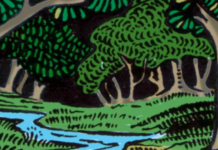
Join My Cult!
, by James Curcio
New Falcon Publications, 1561841730, 256 pp., 2004
When confronted with disorder the brain will attempt to overlay some form or pattern to make sense of the chaos. The meticulous geometries often accompanying psychedelic hallucination are one example of this phenomena. The brain, it seems, is an organizing device that recoils at disorder and attempts to subdue it with it’s own imposed sensibilities. Such is the experience of reading James Curcio’s mindwarping novel, Join My Cult!
Alexi and Ken are two teenagers in suburbia trying to cut through all the normalcy and order of their lives by investigating the arcane and occult. Their deepening investigations into the nature of reality and the hive mind begins to reveal the seeming existence of an enigmatic cult: The Mother Hive Brain Syndicate. Johny, another teen trying to sort his way through a world increasingly inconsistent with what he’s been raised to believe, also discovers the fiendish machinations of MHBS. Meanwhile, Agent 139 and Jesus (and later, Agent 506) are clearly agents of MHBS hell-bent on completely eradicating the status quo consensual reality through an increasingly severe rash of pranks and thoughtcrimes, culminating in the destruction of a Lenny’s diner. Behind them all looms the mysterious mystic Aleonus de Gabrael – sort of a younger, more vital Alan Moore, or a more overtly revolutionary Aleister Crowley – guiding and educating the whole lot, possibly as the head of MHBS and it’s affiliates.
What are the aims of this counter cultural eso-terror organization? Cuciro never makes it quite clear and it’s uncertain whether or not they even exist, but that’s all part of the game. The narrative is fractured and hallucinogenic, veering from coherent tales of Alexi and Ken’s experiences guiding their group into uncharted waters, then diving into unhinged dreams, alien/entity encounters, psychedelic journeys, schizophrenic agitprop confrontations by Jesus and Agent 139, and then swinging back into deeply revealing and compelling thoughts on magick and reality. Indeed, the most astounding current within Curcio’s work is the depth and practicality of his understanding of those technologies commonly referred to as The Occult. Within the more sober dialogues Curcio presents an ontology that reaches into the soul and reveals to the reader the error of history and the path to its redemption. These insights are the unshakable foundation of a house that’s quickly falling into the ground.
The work above all is Abyssal. It’s fractured like the mirror of Self that recurs throughout the novel, plunging into the depths of madness. The sober voice of Aleonis is the only light through the dark night, impelling us to break the mirror but also telling us how to put it back together again. Solve et coagula. The characters are at once illusory and amorphous, difficult to pin down and understand, then suddenly and surprisingly rich with inner turmoil and suffering, deeply human and alive against the howling wind. Amidst the chaos, the heartfelt moments of confession and intimacy anchor the characters and remind us that they’re human too, in spite of the extremity of their divorce from the consensus. And it’s this intimacy, this thirst for community and a sense of one’s tribe, that Curcio is begging us to acknowledge within ourselves and to make manifest in an increasingly lonely and fragmented world.
At times the story hints at science fiction or some alien technology wielded with possibly sinister motives by the Mother Hive Brain. As all visions do, the narrative continuously fades from dreamscape to hallucination to schizophrenia, so any real attempt to follow some of these literary devices ultimately fails. In other words, don’t expect Join My Cult! to answer as many questions as it raises. Seemingly important elements of the story that are introduced early on are completely abandoned in the later half. Diverse characters begin to overlap and appear to be the same, possibly all of them only a single being reflected through multiple selves. Maybe it all happened, or maybe it was all a hallucination of Alexi’s. Like Wilson & Shea’s epic Illuminatus! (to which Curcio’s work has already been compared by Peter Carroll) the journey is more important than the destination.
Join My Cult! will surely baffle many readers and annoy others, but it should nevertheless be standard reading for anyone questioning the world they’ve been told is real when their experiences plainly contradict it. Consume it like a drug or a hypersigil. Just take it in, don’t get too caught up in finding patterns, and let it seep into your blood and work it’s magick. Join the cult, but know that, as Gabrael says, “the real order that doles out initiation, that creates the kind of synchronicities that brought you here and will carry you on to the next step of your mission, is the Universe itself.”








